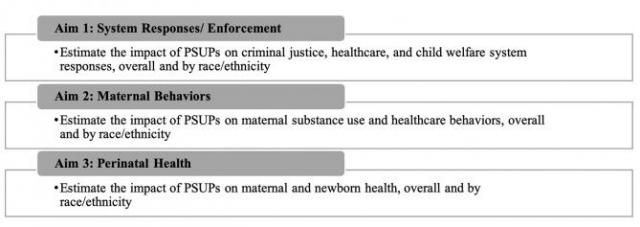Project Summary
The research team is evaluating how different prenatal substance use policies (PSUPs) impact (1) how systems, such as child welfare, criminal justice and healthcare providers, respond; (2) maternal substance use and healthcare behaviors; and (3) maternal and newborn health. The researchers are also examining whether the policies have differential impact based on the mother’s race and ethnicity.
Research Questions/Aims
- Do supportive prenatal substance use policies lead to improved maternal health behaviors and, in turn, better maternal and newborn health outcomes?
- Do punitive, reporting, or testing policies change healthcare practices or lead to greater involvement of child welfare or criminal justice systems?
- If so, how do these changes impact maternal and child health?
- Do punitive reporting or testing policies more adversely impact women of color?
Actionability
- Inform policy and practice approaches for preventing or treating substance use during pregnancy; reducing racial or ethnic disparities in substance-related pregnancy outcomes; and improving maternal and newborn health.
Outcomes

Methodology
The research team is using a quasi-experimental difference-in-differences framework that leverages the staggered implementation of PSUPs and compares changes in outcomes before and after implementation between PSUP and non-PSUP states. Additionally, four secondary data sources will be used, including the Healthcare Cost and Utilization Project (HCUP), the Pregnancy Risk Assessment Monitoring System (PRAMS), the Treatment Episode Data Set Admissions (TEDS-A), and the National Child Abuse and Neglect Data System (NCANDS).

Joan & Sanford I. Weill Medical College of Cornell University